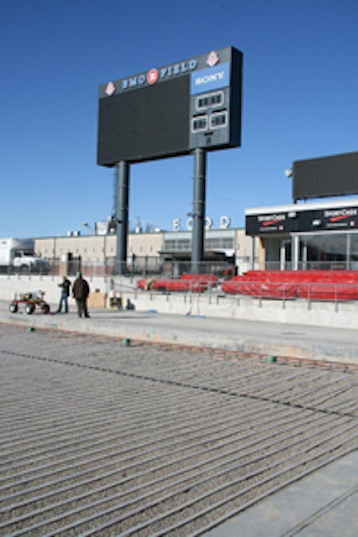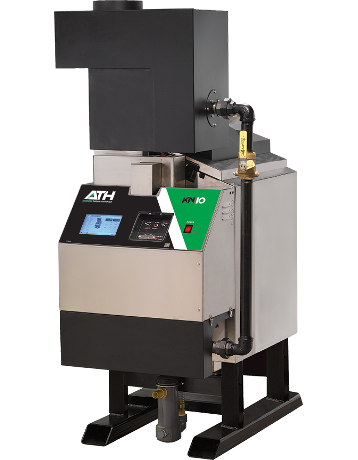BMO Field
BMO Field is Canada's premier soccer field. It is home to Canada's National Soccer Team as well as Toronto FC (TFC), Canada's first Major League Soccer team. When BMO Field opened in 2007, it was equipped with the latest FieldTurf synthetic grass surface. At the time, the 'state-of-art' synthetic turf was thought to be a solution that would mimic grass without incurring the heavy maintenance costs tied to natural grass. The players, however, gave harsh criticism to the synthetic turf. When the TFC repeatedly encountered clubs that refused to play on synthetic grass, frustration levels escalated and stadium officials were forced to reevaluate their decision. In August of 2009, TFC owners, Maple Leaf Sports & Entertainment Ltd (MSLE), paid $250,000 for a temporary natural grass surface in order to host Real Madrid, Spain's top professional soccer team. It was only a ten-day solution but it was required to attract a top-notch team.
The KN-20 system circulates a warm, water-and-glycol solution through loops of PEX tubing buried below the surface.
While it was clear that natural grass was a necessity in order to play with the top teams, the cold conditions of Toronto and a season that runs from March through November presented a significant challenge. MSLE decided upon an innovative turf conditioning system similar to those used in other cities where the weather can be as harsh as Toronto's. The system would ensure the field would remain in top, playable condition throughout the year. At the heart of this innovative system are four (4) ATH KN20 boilers that supply the necessary 8 million BTUs of heat that not only keep the grass healthy and green, but also prevent the ground from freezing, reducing the chance of player injury. The system circulates a warm, water-and-glycol solution through loops of PEX tubing buried below the surface. The heat then radiates into the root zone beneath the grass, so that the playing surface remains soft and forgiving to falling players, even at sub-freezing temperatures. Sensors, grouped in zones, monitor the soil conditions. The need for warmth varies, so temperature sensors communicate back to boilers. HEATNET, ATH's proprietary integrated boiler management system monitors the system demands and modulates boiler firing rates to provide the ideal flow of warm water from the KN20 boilers, all while maximizing turndown ratios for peak efficiency. As the outdoor temperature falls, the system automatically boosts the water temperature in the tubing to protect the turf root system.
The Morgan Group, a manufacturer's representative located in Markham, ON, was brought in to consult on the project. According to company representative Brian Morgan, the ATH KN Series boilers were an ideal fit for the system for a number of reasons. First, with the mechanical room located under the stands, space was very limited. The compact KN20's fit easily, even leaving some valuable extra space. Second, the ability of the KN Series boilers to be common vented was absolutely mandatory as they simply did not have any other way to vent the boilers.

However, it was the ultra high efficiency of the condensing KN boilers that was of paramount importance. 'It takes a lot of heat to warm an entire field in November and that can be costly for the owners,' said Morgan. He also noted that MSLE management was quite impressed with the 21-year thermal shock warranty. 'There is a high temperature differential on this type of system and the water can return to the boilers fairly cold. The KN boilers handle the low temperature return water with ease,' said Morgan. The stadium with its new natural grass surface reopened in April 2010. Authorities, who were hoping that the natural grass would prove to be a game changer, are already seeing the payoff. In fact, BMO field hosted the MLS Cup 2010. It was the first time the championship event had been held outside the U.S.

